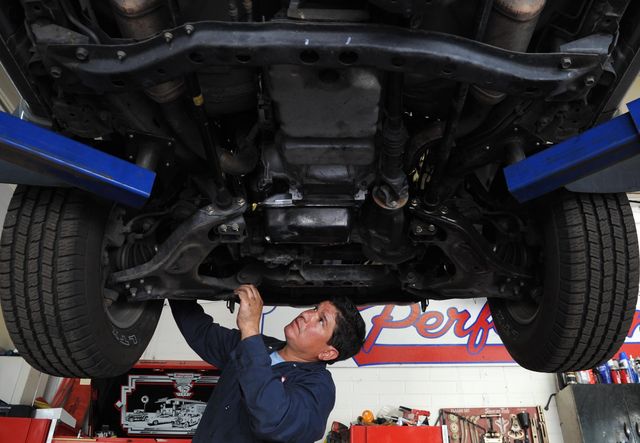Usual Indicators of Transmission Troubles and What You Can Do Concerning Them
Transmission troubles in automobiles can create substantial trouble and prospective safety and security hazards. Identifying the usual indications of transmission problems can aid you resolve them immediately and prevent further damage or costly repairs. This article will certainly review several of the regular warning signs, such as weird sounds, difficulty moving gears, melting smells, fluid leakages, and delayed interaction. By being aware of these indicators, you can take ideal action to stop further damages to your transmission and guarantee the smooth procedure of your car. Whether it's seeking professional aid or taking safety nets, recognizing these indications encourages you to make educated choices and preserve the longevity of your automobile's transmission.
Strange Sounds
One typical sign of transmission issues is the incident of weird sounds, which can indicate underlying problems that call for instant interest. These unusual sounds can vary in nature and intensity, and they commonly function as an indication that something is amiss with your automobile's transmission system.
Among the most common strange sounds connected with transmission problems is a grinding sound. This audio generally happens when changing equipments and can show damaged equipments or a lack of transmission fluid. Disregarding this sound can result in additional damages to the transmission system, causing pricey repair work.
An additional sound to be skeptical of is a whining or humming sound. When the vehicle is in neutral or when speeding up, this sound is often listened to. It can indicate low transmission fluid degrees or a stopping working pump. Resolving this problem without delay can prevent further damage to the transmission and expand its life-span.

Lastly, a clunking or banging noise can also be a reason for worry. When shifting equipments or during acceleration and slowdown, this noise is generally listened to. It can represent damaged or broken transmission mounts, which can result in the transmission ending up being misaligned or disconnected.
Trouble Shifting Gears
If you experience difficulty moving equipments in your lorry, it may suggest transmission problems. Problem changing equipments can materialize in different ways, such as grinding, slipping, or hesitation when altering equipments. This issue can take place in both manual and automated transmissions and must not be disregarded, as it might lead to additional damages and costly repair services otherwise addressed quickly.
One feasible root cause of problem moving equipments is reduced transmission liquid levels. Inadequate fluid can impede the smooth operation of the transmission, making it harder to involve the equipments effectively. transmission shops Triad Area. Inspecting the fluid level and adding more if necessary may ease the trouble.
Another prospective perpetrator is a worn clutch or clutch components in manual transmissions. With time, the clutch can come to be used, leading to problems in changing equipments efficiently. In such situations, changing the used clutch or its elements may be required to restore proper shifting.
In transmissions, troubles moving gears can be brought on by issues with the valve body or solenoids. The shutoff body manages the circulation of transmission liquid, while the solenoids control the pressure required for gear modifications. If these parts end up being defective, it can result in equipment changing troubles. In such instances, looking for professional support is encouraged to deal with the problem and identify.
Burning Smell
A burning odor is a clear sign of prospective transmission troubles. It is essential not to overlook it as it could be an indicator of a major problem with your transmission if you notice a burning smell coming from your lorry. The transmission is in charge of transferring power from the engine to the wheels, and any kind of problems with it can affect the efficiency and safety and security of your car.
There are numerous potential causes for a burning scent in your browse around this web-site transmission. One typical reason is overheating, which can take place due to reduced transmission liquid degrees or a malfunctioning cooling system.
If you find a burning scent, it is crucial to deal with the problem without delay. Ignoring it can lead to further damage to your transmission and costly repair work. The primary step is to inspect the transmission fluid level and problem. If it is reduced or has a scorched odor, it might be necessary to refill the liquid or replace. Nonetheless, if the issue lingers, it is suggested to look for professional aid from a certified technician that can identify and repair the hidden issue. Remember, very early detection and intervention can protect against more significant troubles down the line.
Liquid Leaks
Liquid leaks are a typical indicator of transmission problems and need to be attended to quickly to avoid more damage. Transmission liquid plays a vital role in the smooth procedure of a vehicle's transmission system. It oils the moving components, cools down navigate here the transmission, and gives hydraulic pressure for equipment shifts. Any leak of this liquid can lead to significant issues and possible failure of the transmission.
Identifying a transmission fluid leak is fairly very easy. One of the most evident indicators is the presence of red or brown liquid pools below the vehicle. The liquid may have an unique burned scent or a sweet odor, relying on the sort of transmission liquid made use of. In addition, low transmission fluid levels can trigger issues such as sliding gears, postponed or irregular changing, or strange sounds coming from the transmission.
When faced with a liquid leakage, it is vital to take immediate activity. Typical locations where leaks occur consist of the transmission pan gasket, output shaft seal, input shaft seal, and transmission cooler lines.

Postponed Interaction
One usual sign of transmission problems is a delayed engagement, which can be an indication of underlying concerns that call for prompt focus. When moving gears or when the car takes longer than normal to react to the vehicle driver's input, postponed involvement refers to the hold-up experienced (transmission repair Triad Area). This can materialize as a jerking or a doubt movement when trying to accelerate from a total quit.
There are a number of potential reasons for postponed engagement. One possibility is reduced transmission fluid levels, which can stop the transmission from operating properly.
If you're experiencing postponed interaction, it is important to deal with the problem promptly. Overlooking it can lead to more damages to the transmission and extra costly fixings down the navigate to this site line. The initial step is to check the transmission liquid levels and guarantee they go to the suitable level. Including more may fix the issue if the liquid is low. If the problem lingers, it is suggested to consult an expert technician that can identify and fix the underlying cause of the delayed involvement.
Verdict
To conclude, recognizing usual signs of transmission problems such as weird noises, trouble changing equipments, melting odor, liquid leakages, and postponed engagement is important for preserving a well-functioning automobile. By quickly attending to these problems, people can stop additional damages and pricey fixings. Normal upkeep and seeking expert support when needed will guarantee the smooth operation of the transmission and lengthen the life-span of the lorry.
It can represent broken or damaged transmission places, which can lead to the transmission becoming misaligned or disconnected. (transmission repair Triad Area)
Transmission fluid plays an essential function in the smooth operation of an automobile's transmission system. Furthermore, low transmission fluid levels can cause troubles such as slipping equipments, postponed or erratic shifting, or strange sounds coming from the transmission.
Typical locations where leakages occur consist of the transmission frying pan gasket, result shaft seal, input shaft seal, and transmission colder lines. One possibility is reduced transmission fluid degrees, which can stop the transmission from operating correctly.